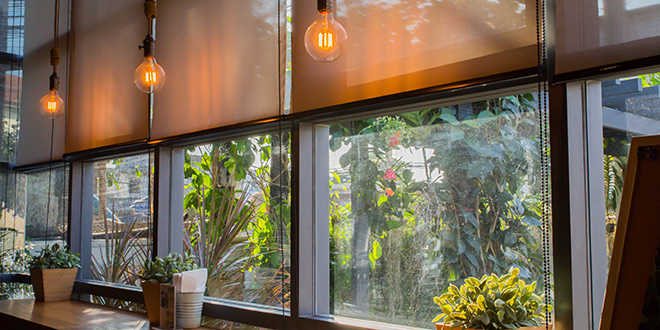Adding or changing your window coverings is a simple interior design element that will improve the look and feel of a room while providing the desired level of light control. However, many shoppers are new to window coverings and may use the terms “blinds” and “shades” interchangeably. In reality, blinds and shades are distinctly different and offer vastly different qualities as window treatments. Understanding the difference between blinds and shades will help you decide which is the best match for your window.
What are Blinds and Shades?
Blinds are hard, horizontal slates controlled by the user with a manual pull cord. Blinds can be adjusted to open and close only certain portions, or raise and lower the entire blinds to change the amount of light allowed. Common types of blinds are wood, faux-wood, woven wood, mini blinds, and vertical blinds. Blinds offer a classic, traditional look to match many decor styles.
Shades are soft and hung on a continuous roll to cover a large window opening and they stack at the top. Using a cord or spring device, shades are drawn up or down. These soft window treatments provide a smooth look that is warm and flowing. Roller shades, roman shades, and cellular shades are the most popular types of shades.
Benefits of Blinds
Blinds offer more privacy and better light control than shades. Blinds can be fully raised or lowered, and the slates can also be tilted open or closed. Since blinds offer more light-control they can help keep your home cool in summer by blocking out more light. Maintenance is easier for blinds as they are created from hard, non-absorbent materials that can be easily wiped down with soap and water. Although it depends on material and quality, blinds are generally more durable and handle the wear and tear better than shades. Blinds tend to suit architectural windows, like bay windows or short, wide windows.
Benefits of Shades
Shades offer great options for customization as they come in many different colors. Different colored shades provide different levels of light control. Room-darkening shades are a good option to block out light completely. Since shades do not have slates, they offer privacy and are a good choice for bedrooms. Shades also help insulate your homes and are energy-efficient. Cellular shades are particularly good at insulating your windows because of their fabric air pockets. Shades also work well for tall, slender windows.
Professional Installation
Consult a professional for blind or shade insulation. A+ Blinds offers blind, shade, and shutter services for the surrounding Indianapolis area. We offer an extensive selection to help you perfectly complement your home, apartment, or office. During your free consultation, you can test the different options right in your space to help determine which is the best fit. The consultation will help you decide if blinds or shades are the right option for you, and we will professionally measure your windows to provide you with an affordable estimate. Give us a call to learn how A+ Blinds can provide you with the perfect window treatment solution by visiting our website or calling us at (317) 698-5445.
